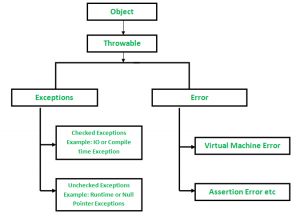JAVA: Cek & Uncek Exception di Java
An exception is an unwanted or unexpected event, which occurs during the execution of a program i.e at run time, that disrupts the normal flow of the program’s instructions. In Java, there are two types of exceptions:
- Checked exceptions
- Unchecked exceptions
Pengecualian adalah peristiwa yang tidak diinginkan atau tidak terduga, yang terjadi selama pelaksanaan program yaitu pada waktu berjalan, yang mengganggu aliran normal instruksi program. Di Jawa, ada dua jenis pengecualian:
- Pengecualian yang diperiksa
- Pengecualian yang tidak dicentang
Checked Exceptions
These are the exceptions that are checked at compile time. If some code within a method throws a checked exception, then the method must either handle the exception or it must specify the exception using the throws keyword.
For example, consider the following Java program that opens the file at location “C:\test\a.txt” and prints the first three lines of it. The program doesn’t compile, because the function main() uses FileReader() and FileReader() throws a checked exception FileNotFoundException. It also uses readLine() and close() methods, and these methods also throw checked exception IOException
Ini adalah pengecualian yang diperiksa pada waktu kompilasi. Jika beberapa kode dalam suatu metode melempar pengecualian yang dicentang, maka metode tersebut harus menangani pengecualian atau harus menentukan pengecualian menggunakan kata kunci throws.
Sebagai contoh, perhatikan program Java berikut yang membuka file di lokasi "C:\test\a.txt" dan mencetak tiga baris pertama. Program tidak dapat dikompilasi, karena fungsi main() menggunakan FileReader() dan FileReader() melempar pengecualian yang dicentang FileNotFoundException. Itu juga menggunakan metode readLine() dan close() , dan metode ini juga membuang pengecualian yang diperiksa IOException
Contoh:
// Java Program to Illustrate Checked Exceptions
// Where FileNotFoundException occured
// Importing I/O classes
import java.io.*;
// Main class
class GFG {
// Main driver method
public static void main(String[] args)
{
// Reading file from path in local directory
FileReader file = new FileReader("C:\\test\\a.txt");
// Creating object as one of ways of taking input
BufferedReader fileInput = new BufferedReader(file);
// Printing first 3 lines of file "C:\test\a.txt"
for (int counter = 0; counter < 3; counter++)
System.out.println(fileInput.readLine());
// Closing file connections
// using close() method
fileInput.close();
}
}
Output:
To fix the above program, we either need to specify a list of exceptions using throws, or we need to use a try-catch block. We have used throws in the below program. Since FileNotFoundException is a subclass of IOException, we can just specify IOException in the throws list and make the above program compiler-error-free.
Untuk memperbaiki program di atas, kita perlu menentukan daftar pengecualian menggunakan throws, atau kita perlu menggunakan blok try-catch. Kami telah menggunakan lemparan dalam program di bawah ini. Karena FileNotFoundException adalah subkelas dari IOException, kita dapat menentukan IOException di daftar lemparan dan membuat program di atas bebas dari kesalahan kompiler.
Contoh:
// Java Program to Illustrate Checked Exceptions
// Where FileNotFoundException does not occur
// Importing I/O classes
import java.io.*;
// Main class
class GFG {
// Main driver method
public static void main(String[] args)
throws IOException
{
// Creating a file and reading from local repository
FileReader file = new FileReader("C:\\test\\a.txt");
// Reading content inside a file
BufferedReader fileInput = new BufferedReader(file);
// Printing first 3 lines of file "C:\test\a.txt"
for (int counter = 0; counter < 3; counter++)
System.out.println(fileInput.readLine());
// Closing all file connections
// using close() method
// Good practice to avoid any memory leakage
fileInput.close();
}
}
Output:
First three lines of file "C:\test\a.txt"
Unchecked Exceptions
These are the exceptions that are not checked at compile time. In C++, all exceptions are unchecked, so it is not forced by the compiler to either handle or specify the exception. It is up to the programmers to be civilized, and specify or catch the exceptions. In Java exceptions under Error and RuntimeException classes are unchecked exceptions, everything else under throwable is checked.
Consider the following Java program. It compiles fine, but it throws ArithmeticException when run. The compiler allows it to compile because ArithmeticException is an unchecked exception.
Ini adalah pengecualian yang tidak diperiksa pada waktu kompilasi. Di C++, semua pengecualian tidak dicentang, sehingga tidak dipaksa oleh kompiler untuk menangani atau menentukan pengecualian. Terserah programmer untuk beradab, dan menentukan atau menangkap pengecualian. Dalam pengecualian Java di bawah kelas Error dan RuntimeException adalah pengecualian yang tidak dicentang, semua yang lain di bawah throwable dicentang.
Perhatikan program Java berikut. Ini mengkompilasi dengan baik, tetapi melempar ArithmeticException saat dijalankan. Kompiler mengizinkannya untuk dikompilasi karena ArithmeticException adalah pengecualian yang tidak dicentang.
Contoh:
// Java Program to Illustrate Un-checked Exceptions
// Main class
class GFG {
// Main driver method
public static void main(String args[])
{
// Here we are dividing by 0
// which will not be caught at compile time
// as there is no mistake but caught at runtime
// because it is mathematically incorrect
int x = 0;
int y = 10;
int z = y / x;
}
}
Output:
Exception in thread "main" java.lang.ArithmeticException: / by zero
at Main.main(Main.java:5)
Java Result: 1
